 |  |
By Tom Gatch
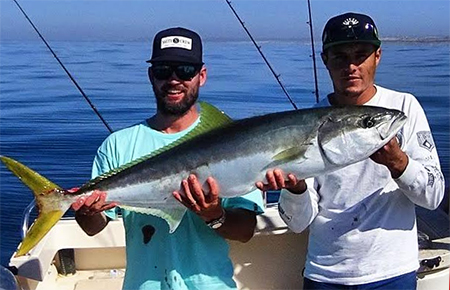
Baja’s extremely productive summer fishing season closed out this year in classic fashion; with a couple of hurricanes off the southern tip of the peninsula. First, Newton smacked Los Cabos and the surrounding region with heavy gusts, rain and flooding. And it was then promptly followed by the arrival of Hurricane Paine, which also ended up bringing several days of variable tropical showers to northern Baja and southern California.
With the arrival of fall, however, fishing patterns have quickly rebounded back to their seasonal norms, which have been supported by the warmer surface water temperatures that have remained behind after the brief spells of inclement weather. Offshore action on small to medium sized yellowfin and occasional bluefin tuna with a smattering of dorado between 8 and 15 pounds has remained steady, but will likely drop off over the next few months the further north that anglers tend to fish. Nonetheless, the inshore bite on quality yellowtail in the 12 to 25 pound class shows signs of possibly continuing through the end of the year.
The most productive yellowtail fishing during this time of year generally takes place around the coastal island groups spanning from Los Coronados just south of the border all the way down to Islas Cedros and Benitos off of Baja’s central Pacific coast.
The cooler the subsurface water temperature, the more likely it is that yellowtail will be holding deeper in the water column. These are the times when it makes more sense to drop down and fish with a heavier ‘yo-yo iron’ style jig than it does to run out a live bait, or troll a lure near the surface.
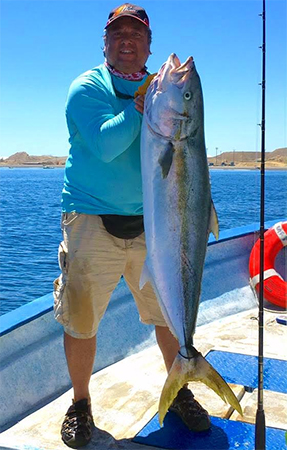
To accomplish this, simply allow your lure to descend all the way to the bottom, and the begin reeling up quickly until the jig is about half the way back to the surface. Disengage your reel and let it drop back down again, taking care not to allow a backlash. Continue this practice until you get a strike, which may often come on the drop. If you don’t get bit within about 10 minutes, it’s time to move the boat.
Some of the best lure colors for this type of fishing are blue/chrome, blue/white and ‘scrambled egg’, which is has mottled yellow-ish hue that some anglers say mimics the appearance of a juvenile dorado.
As always, this time of year knowledgeable private boaters are responsible for taking a majority of these fish, as opposed to open party boats with lots of passengers that must fish for smaller, more prolific inshore species like barracuda, bonito and bass in order to keep their customers happy.
As an example, Sergio’s Sportfishing in Ensenada reported a recent one day catch for half a dozen anglers aboard the No Limitz ll, which was comprised of 12 barracuda, 5 bonito, 15 calico bass, 3 sand bass, 19 rockfish and 6 California sheephead - but no yellowtail. However, panga anglers fishing with Vonny’s Fleet near the rocky pinnacles at the tip of the Punta Banda just a few miles south ended up taking several quality grade yellowtail on the troll, and only a smattering of smaller fish species being caught.
Down the coast in Bahia San Quintin, Captain Kelly Catian at K&M Sportfishing reports a banner bite on fat yellowtail to 28 pounds, as both his rod and reel anglers and spearfishing clients loaded up on the bounty. Catian indicated that they have also been enjoying great inshore action on calico bass weighing between 4 and 8 pounds. He added that the warmer water temperatures have produced a few triggerfish, which are usually found much further south.
Cedros Outdoor Adventures reported that their yellowtail fishing slowed down a bit due to the arrival of millions of red crabs around the island shortly before the late summer storms hit. Quality calico bass fishing with plastics, however, remained strong in the dense local kelp beds.
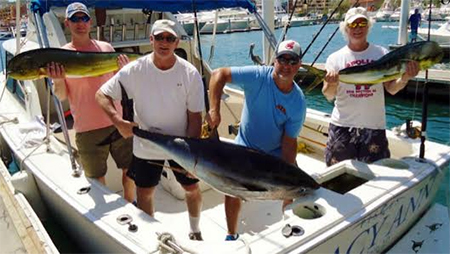
Further south in Baja Sur, offshore action outside Bahia Magdalena picked up considerably shortly after the passing of Hurricane Paine. With the coming of fall, there has been a good showing of hungry wahoo, with a few yellowfin tuna and dorado thrown in the mix.
Down in Cabo San Lucas, Pisces Sportfishing indicated that although they have been able to take advantage of a hot billfish bite offshore, most of their boats have been catching mostly football size yellowfin, small to medium dorado and a few wahoo with a few much larger tuna being taken intermittently by their clients.
Just to the east in San Jose del Cabo, Erik Bricston at Gordo Banks Pangas reports that the water conditions have rebounded well after the departure of recent hurricanes. Bricston added, “The yellowfin tuna bite definitely improved, anglers found various grades of tuna, ranging from football sized, many fish in the 20 to 50 lb. class, a handful to over 100 lb. and even at least a couple of super cows of over 300 lb. that were caught by local anglers fishing on the Gordo Banks later in the day after the crowds lightened up. Drift fishing with strips and chunks of various baits was the technique now being used. Action came in spurts, sometimes early, other times late, lots of pressure on these areas now, since this is where the only real bite is now being found. Individual charters accounted for a couple of tuna per morning, up to ten or more.
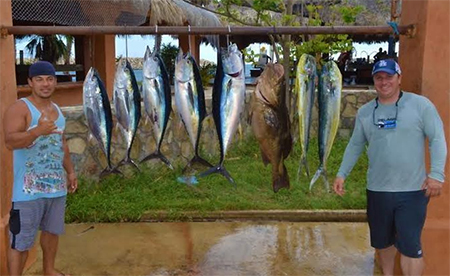
Yellowfin tuna were definitely the most common species being successfully targeted now, with only a few amberjack, grouper, rainbow runner, triggerfish and various snappers and pargo being taken. The wahoo went on a limited bite on the fishing grounds just north of Punta Gorda. Dorado have been scattered throughout the same areas, though recently it has been rare to see a dorado over ten pounds.” He concluded by saying that there has been a good billfish bite developing further north of them on the East Cape, with lots of blue marlin reported to be in the mix. There have also been stories of huge black marlin being hooked on lighter leaders that were intended for leader shy yellowfin tuna, which were quickly sawed off by the big fish that resulted in a heartbreaking loss.
Up the Cortez coast in La Paz, Jonathan Roldan at Tailhunter International says, “If you happened to be fishing with our La Paz fleets recently, I could pretty much do something that I never do - guarantee that you will catch fish! There’s plenty of dorado everywhere. You cannot help but catch dorado right now.
The downside is that there are so many small ones out there, which are literally the size of a big trout, that it almost feels like you are molesting the nursery. But, these little guys go after anything that’s in the water; and they destroy any bait you put out there. But that’s the only way you are going to catch anything even remotely larger!
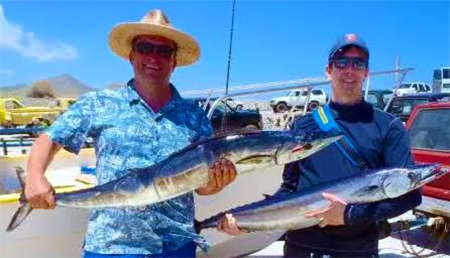
It’s rather simple - if you don’t have line in the water, you’re not going to catch any fish. Luckily, there are also some larger 10 to 30 pound fish running in with the small ones. The good news is that dorado are the fastest growing fish in the ocean, and within a month or two most of these fish will double or even triple in size.” Roldan added, “On the other hand, our fleets fishing Las Arenas and Muertos Bay have been taking quality wahoo between 20 to 50 pounds. There has also been a good mix of yellowfin tuna in the 10 to 20 pound class. The dorado here are running much bigger than the one being caught by the La Paz boats. Many have been in the 10 pound class, with some of the largest dorado that I’ve seen in almost two years that weigh 30 pounds or more.
The Las Arenas fleets have also been catching and releasing some monster roosterfish that weigh up to about 80 pounds! As a matter of fact, the smallest one that we’ve taken recently was in the mid-20’s with most of the roosters in the 40 pound class.
Here’s the ticket…we had squid! Several weeks ago when the tuna and dorado showed up, we cut open bellies and found they had baby squid in them. The problem is that there’s zero baby squid to be caught. Impossible. So, for about 2 weeks now, we have our staff head to town and buy every bit of fresh giant squid they can get their hands on. Every night, I’m cutting up to 100 pounds of blocked frozen squid into 3 pound bags to sell to our guys. From what I hear, we’re buying out the city and are the only ones with the squid. The fish are eating it and, at the very least makes great chum. It is not common bait squid. This is restaurant grade calamari. It’s expensive. But the fish eat it and it’s making all the difference in the world.”
Roldan concluded his report by saying, “For the roosterfish, however, the best bait is still the big ladyfish so be patient. You do have to catch these baits yourself, and you can only catch them one-at- a-time, but this is what the big roosters want. Anything that can wrap its mouth around an 18-inch bait is going to be big!”
But no matter where or how you plan to fish, now is the time to grab your gear and head down to Baja; while the weather and water temperatures are both still delightfully warm!

fast replies and great price!

Very good ans very fast. We hope all will ben good if we need it.

Baja Bound made it SO EASY to purchase insurance for our one week trip to Tijuana. I would...